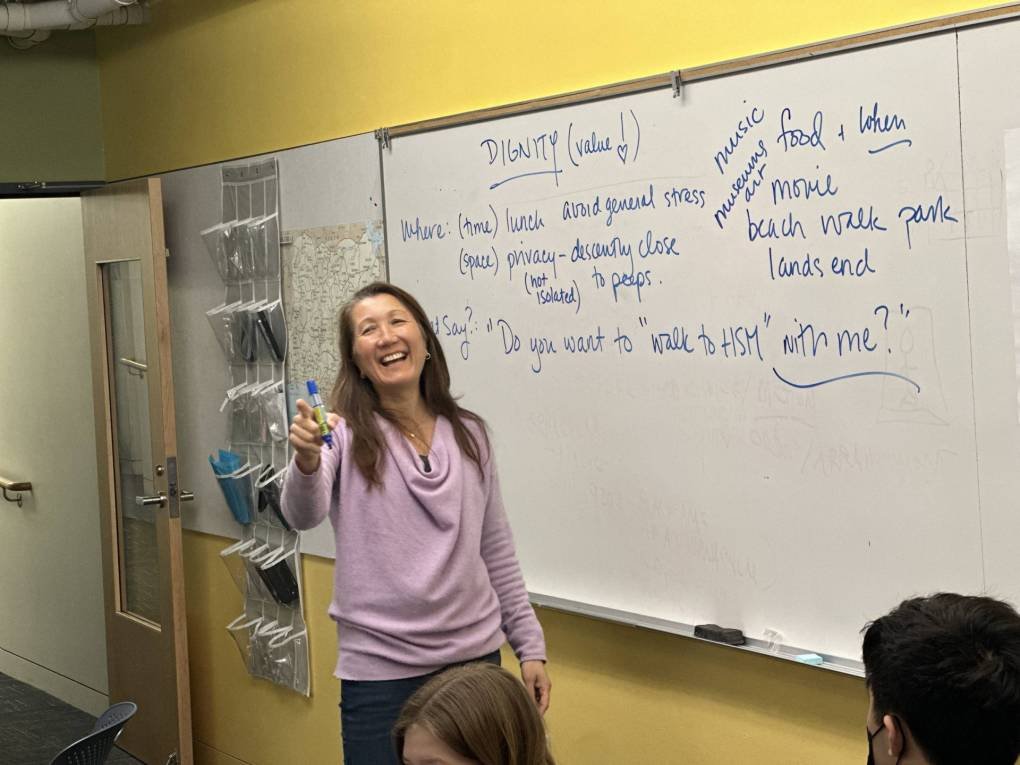Consent education can help teens have better romantic relationships and can even help schools create a culture of empathy and inclusion. This Mind/Shift piece zooms in on one educator’s experience and cites MCC’s romantic relationships report.
Read MoreRead the latest from Making Caring Common!
You’re in the right place for our media coverage, blog posts, and event information. Our work spans a range of topics, all connected by our commitment to elevate caring and concern for the common good at school, at home, and in our communities. You can review what’s new below or use the dropdowns to sort by topic and category.
Be sure to join our email list and connect with us on Facebook, LinkedIn, and Instagram, to stay current with Making Caring Common’s news and updates. If you’re a member of the media, please visit our Media Room.
Sort by topic
- Access and Equity
- Bias
- Bridging
- Building Connection
- Bullying
- COVID
- CSN
- Caring and Empathy
- College Admission
- Consent
- K-12
- Loneliness
- Mental Health
- Misogyny and Sexual Harassment
- Moral and Ethical Development
- Parenting
- Purpose and Meaning
- Romantic Relationships
- School Culture and Climate
- School Integration
- Social-Emotional Learning
- State of Caring
- Turning the Tide
- Voter Mobilization and Civic Education
- Youth Advisory Board
Sort by category
In this piece for GQ, Eliza Brooke highlights educators who are taking a more holistic approach sex and relationship education and talks to MCC’s Rick Weissbourd about love.
Read MoreIn this piece in Quartzy, Sarah Todd speaks with Making Caring Common’s Rick Weissbourd about sex and relationships: “In terms of human flourishing, there’s nothing more important we can do to than help young people prepare to love.”
Read MoreIn this piece in The Conversation, Jordan Long cites Making Caring Common’s research on when (and if) parents talk to their kids about sex and relationships: “Although parents can play a powerful role in a child’s sexual socialization, a Harvard Graduate School of Education report found that roughly 50 per cent of parents express uneasiness when attempting to discuss sex with their children. More than 40 per cent of parents don’t discuss sex with their children until after they are sexually active.”
Read MoreIn this piece for Education Week, Sarah D. Sparks highlights Making Caring Common’s research on sexual harassment and misogyny among young people.
Read MoreIn this piece in HGSE’s Usable Knowledge by Grace Tatter, Rick Weissbourd says, “It’s so critical that kids are able to undertake this work of learning to love somebody else. They’re not going to be able to do it unless we get them on the road and are willing to engage in thoughtful conversations.”
Read MoreIn this piece in The New York Times by Lisa Damour, Rick Weissbourd explains that the first forays into sexual activity are often “overloaded with expectations as well as worries about performance.” Making Caring Common’s report The Talk is also cited.
Read MoreAs parents and caregivers, we must do better to prevent children and youth from harming or being harmed, and to help them become caring, humane people. We have tremendous power to shape their understanding of assault and consent, and to be part of the solution to this destructive epidemic. In this article in The Washington Post, MCC leaders Rick Weissbourd and Alison Cashin offer five guideposts to help parents begin these essential conversations.
Read MoreIn this piece in The Wall Street Journal, Making Caring Common’s report The Talk is cited. Difficult conversations about sex and consent have become even more complex — but here’s how dad’s can persist.
Read MoreWe need to talk to young people about misogyny, sexual harassment, and assault.
Amid the bitterly polarizing events of the past week, there seemed to be one point of agreement on both sides of the aisle: Sexual assault is an epidemic in this country, with devastating and long-term repercussions for survivors. We also saw that many survivors—for a number of complex reasons—are unwilling to come forward to report their experiences or even discuss them with trusted friends and family.Parents, caregivers, and educators are our first line of defense in preventing misogyny and sexual harassment, and in raising our children—our boys in particular—to clearly understand and take seriously sexual assault and consent. But as we discussed in our report, The Talk, although rates of sexual harassment and sexual assault are alarmingly high in this country, most parents and educators are not having these critical conversations with the young people in their lives.
Read More










